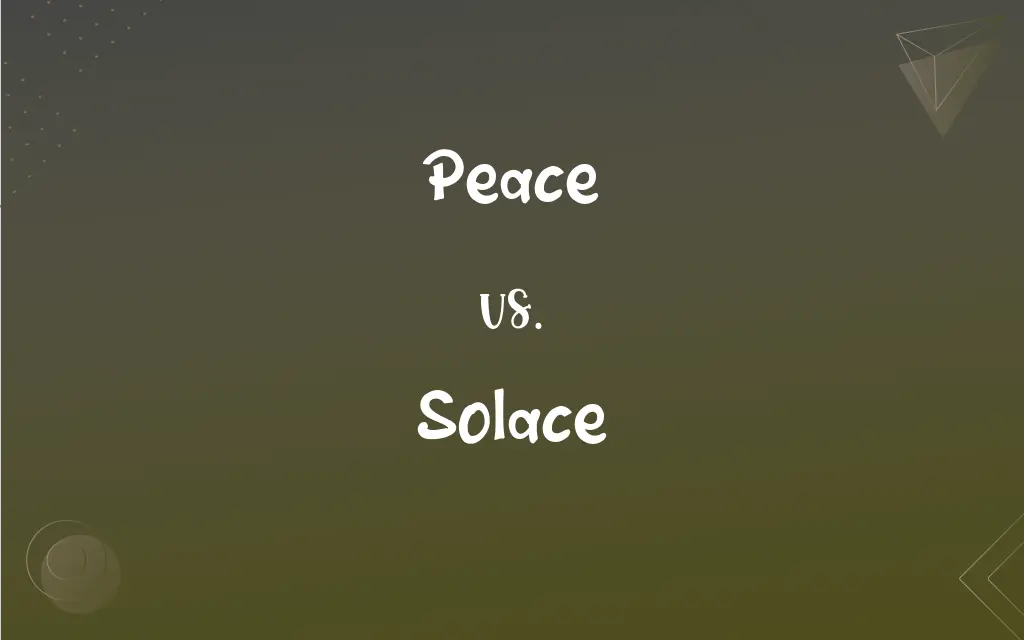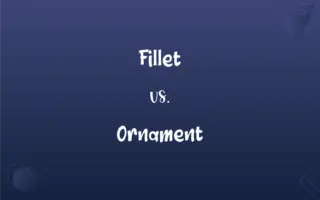Peace vs. Solace: What's the Difference?
Edited by Aimie Carlson || By Janet White || Published on October 24, 2023
Peace refers to a state of calm and harmony, often in a broad context, while solace is comfort or consolation during a time of distress or sadness.

Key Differences
Peace is a state or condition where there is no conflict, disturbance, or tension. It is often used in the context of nations, societies, and individuals. On the other hand, solace pertains to the relief or comfort one seeks or receives during times of sorrow or distress.
While peace can describe the absence of war between countries, solace might be what a grieving family seeks after losing a loved one. They represent different forms of harmony and comfort in various situations.
Peace is often sought on a larger scale, aiming for global resolutions or inner tranquility, while solace is more personal, focusing on alleviating personal pains and sorrows.
One can be at peace when there's an absence of disturbances in their life, while one might seek solace in music, art, or companionship when confronting personal challenges.
Both peace and solace are positive and desirable states of being. However, while peace generally represents a proactive and continuous condition of harmony, solace is reactive, offering a temporary reprieve from sadness or distress.
ADVERTISEMENT
Comparison Chart
Definition
State of calm and harmony
Comfort during distress or sadness
Scope
Can be global or personal
Primarily personal
Duration
Can be long-term or permanent
Typically temporary
Associated Emotions
Tranquility, serenity
Relief, consolation
Common Contexts
War, meditation, societal harmony
Grief, personal challenges
ADVERTISEMENT
Peace and Solace Definitions
Peace
Absence of conflict.
The treaty brought peace to the warring nations.
Solace
Consolation in a time of sadness.
Reading was her solace when she felt alone.
Peace
Inner tranquility.
He felt peace after his meditation session.
Solace
A source of relief.
The peaceful garden was her solace from the city's chaos.
Peace
A state of security.
The fortress stood as a symbol of peace and protection.
Solace
Comfort in sorrow.
She found solace in her friend's kind words.
Peace
The absence of war or other hostilities.
Solace
A relief from discomfort.
The cool breeze was a solace from the heat.
Peace
An agreement or a treaty to end hostilities
Negotiated the peace.
Solace
Alleviation of distress.
Music often provided him solace during tough times.
Peace
Freedom from quarrels and disagreement; harmonious relations
Roommates living in peace with each other.
Solace
Comfort in sorrow, misfortune, or distress; consolation.
Peace
Public security and order
Was arrested for disturbing the peace.
Solace
A source of comfort or consolation.
Peace
Inner contentment; serenity
Peace of mind.
Solace
To comfort, cheer, or console, as in trouble or sorrow.
Peace
Used as a greeting, a farewell, or a request for silence.
Solace
To allay or assuage
"They solaced their wretchedness, however, by duets after supper" (Jane Austen).
Peace
A state of tranquility, quiet, and harmony; absence of violence. For instance, a state free from civil disturbance.
Our lounge strives to maintain an environment of peace for the comfort of our customers.
Solace
Comfort or consolation in a time of loneliness or distress.
You cannot put a monetary value on emotional solace.
Peace
A state free of oppressive and unpleasant thoughts and emotions.
The safety equipment will give me some peace of mind.
Solace
A source of comfort or consolation.
Peace
Harmony in personal relations.
Solace
(transitive) To give solace to; comfort; cheer; console.
Peace
A state free of war, in particular war between different countries.
May there be peace in our time.
Solace
(transitive) To allay or assuage.
Peace
(archaic) Shut up!, silence!; be quiet, be silent.
Solace
(intransitive) To take comfort; to be cheered.
Peace
(slang) Peace out; goodbye.
Solace
Comfort in grief; alleviation of grief or anxiety; also, that which relieves in distress; that which cheers or consoles; relief.
In business of mirth and of solace.
The proper solaces of age are not music and compliments, but wisdom and devotion.
Peace
To make peace; to put at peace; to be at peace.
Solace
Rest; relaxation; ease.
To make his steed some solace.
Peace
(slang) To peace out.
Solace
To cheer in grief or under calamity; to comfort; to relieve in affliction, solitude, or discomfort; to console; - applied to persons; as, to solace one with the hope of future reward.
Peace
A state of quiet or tranquillity; freedom from disturbance or agitation; calm; repose
Solace
To allay; to assuage; to soothe; as, to solace grief.
Peace
To make or become quiet; to be silent; to stop.
When the thunder would not peace at my bidding.
Solace
To take comfort; to be cheered.
Peace
The state prevailing during the absence of war
Solace
The comfort you feel when consoled in times of disappointment;
Second place was no consolation to him
Peace
Harmonious relations; freedom from disputes;
The roommates lived in peace together
Solace
Comfort in disappointment or misery
Peace
The absence of mental stress or anxiety
Solace
The act of consoling; giving relief in affliction;
His presence was a consolation to her
Peace
The general security of public places;
He was arrested for disturbing the peace
Solace
Give moral or emotional strength to
Peace
A treaty to cease hostilities;
Peace came on November 11th
Peace
Freedom from disturbances.
She enjoyed the peace of the countryside.
FAQs
What is the primary context in which peace is used?
Peace is often used in the context of the absence of war or conflict.
When might someone seek solace?
Someone might seek solace during times of distress, sadness, or challenges.
Can one feel at peace without seeking solace?
Yes, one can feel at peace without any preceding distress that requires solace.
Can a nation find solace?
While typically personal, "solace" can be used metaphorically for nations, as in finding solace after a natural disaster.
Are peace and solace opposites?
No, they are not opposites; both denote positive states but in different contexts.
Is world peace a feasible concept?
World peace, as an ideal, is pursued by many, though challenges persist.
How is solace different from comfort?
While both provide relief, solace is specific to alleviating sorrow or distress.
Can nature provide solace?
Yes, many seek solace in the serenity of nature.
Does peace always signify happiness?
Not necessarily; peace denotes a lack of conflict, but one can be at peace without feeling jubilant.
Is inner peace the same as solace?
Inner peace is a sustained state of tranquility, while solace is temporary comfort during distress.
Is solace only sought after a loss?
No, solace can be sought during any distressing or challenging time.
Can music provide both peace and solace?
Yes, music can bring about a peaceful feeling and also offer solace in trying times.
Can a book offer solace?
Yes, many people find solace in reading, especially in relatable or comforting narratives.
Do people universally seek solace in the same ways?
No, the ways in which solace is sought can vary widely based on culture, personality, and circumstance.
Can meditation lead to peace?
Yes, many find inner peace through meditation practices.
Are peace and solace interdependent?
No, one can exist without the other; someone at peace may not need solace, and someone finding solace might not yet be at peace.
Can peace exist in times of war?
While wars disrupt global or regional peace, individuals can still find personal peace in certain aspects of life.
Do animals experience peace and solace?
While it's hard to ascertain, animals do show behaviors suggesting contentment (peace) and seeking comfort (solace).
How can one cultivate peace in daily life?
Practices like meditation, mindfulness, and avoiding conflict can foster peace.
Can solace be found in memories?
Yes, reminiscing about good times can offer solace during challenging periods.
About Author
Written by
Janet WhiteJanet White has been an esteemed writer and blogger for Difference Wiki. Holding a Master's degree in Science and Medical Journalism from the prestigious Boston University, she has consistently demonstrated her expertise and passion for her field. When she's not immersed in her work, Janet relishes her time exercising, delving into a good book, and cherishing moments with friends and family.
Edited by
Aimie CarlsonAimie Carlson, holding a master's degree in English literature, is a fervent English language enthusiast. She lends her writing talents to Difference Wiki, a prominent website that specializes in comparisons, offering readers insightful analyses that both captivate and inform.





































































